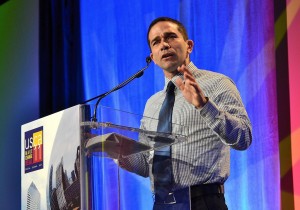 Moises Agosto, Director of Treatment Education, Adherence, Mobilization at NMAC
Moises Agosto, Director of Treatment Education, Adherence, Mobilization at NMAC
I returned to NMAC in 2011 to develop our treatment education, adherence and mobilization division (TEAM). As some of you might remember, 20 years ago, I joined NMAC with the same goal and we were able to develop policies and programs that served as the basis for strong community based HIV treatment education initiatives. All the work accomplished during those years helped thousands of people living with HIV make informed and adequate treatment decisions, enhancing their capacity to adhere to complicated protease based regimens.
Support NMAC’s Treatment Education and Adherence Programs!
Combination therapy was the driving force behind HIV treatment education back then, but today we add other areas that are equally important in not only helping us treat the disease but also prevent transmission. Treatment as prevention has been proven to decrease community viral load and transmission risk, while pre- and post-exposure prophylaxis are effective tools at preventing new infections. All together these biomedical interventions create a path to end AIDS in America. This time around we know that the concept of treatment education must be expanded to include HIV health literacy, but also educate around issues related to comorbidities, aging and overall wellness.
The implementation of the National HIV Strategy and the Affordable Care Act, highlight the growing need for strong programmatic infrastructure and policies to improve HIV health literacy and wellness in communities of color. We believe that for successful implementation, it will be vital to reexamine and reimagine treatment education. As such, on April 3 and 4, the NMAC convened a diverse group of stakeholders ranging from researchers and community based organizations, to government and private funders to participate in the National HIV Treatment Education, Health Literacy and Wellness Think Tank, with the ultimate goal of developing a treatment education plan for the 21st century.
The objectives of the Think Tank were to:
- Understand the current HIV treatment education landscape
- Expand the potential of HIV treatment education/wellness programming
- Identify the challenges social determinants of health pose to successful HIV treatment education programming
- Identify HIV treatment and health literacy guidelines
- Understand the role of patient navigation in ACA and its impact on NHAS goals
- Identify roles of HIV treatment education/wellness in the public, private and NGO sector
Our desired outcomes of the Think Tank were to:
- Establish a blueprint for HIV health literacy and wellness inclusive of social determinants of health
- Identify available funding sources for HIV treatment education/health literacy
- Identify themes for follow-up (i.e., special meetings on a topic, additional think tank, etc.
- Develop recommendations on the role of the public, private and NGO sectors
The think tank consisted of three pillars: assessing and identify the landscape for HIV treatment education, developing a road map on how to transform the field, and developing a framework or blueprint to create an infrastructure responsive to the health literacy needs of people living with HIV and those that serve them.
The result was a robust conversation about the future of treatment education and how it can best be implemented to help bring the HIV epidemic to an end. There were a number of compelling presentations on topics of significance, including an in-depth review of NMAC’s paper, “How To Ends AIDS in The united States: community oriented HIV service delivery, treatment education“, and mobilization As well as a presentation from Harold Phillips of HRSA, who sought to clarify what the ACA’s navigators can and cannot do, what resources are available to implement the program, and recommendations for how the community should re-think Ryan White service categories used for outreach, enrollment, and benefits counseling in light of the ACA.
The enthusiastic exchange of ideas demonstrated that there is renewed energy around treatment education and the development of a plan that can effectively improve health literacy, outcomes, and overall quality of life.
As a result of the think tank we created four working groups to refine the details of the blueprint. Those four working groups are content, policy, social determinants of health, and HIV-positive leadership. As part of the action plan the four working groups will be charged with providing the content or criteria of the future blueprint which will be revealed in draft form at USCA in September and presented to the larger HIV community on World AIDS Day 2013. Stay tuned for updates! And be sure to register for this year’s USCA in New Orleans to learn the latest about our treatment education efforts and how they can help bring an end to this epidemic.
Yours in the Struggle,
Moises Agosto
Director, TEAM